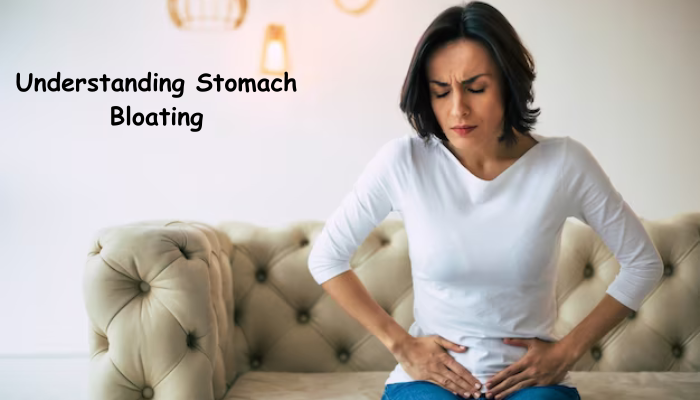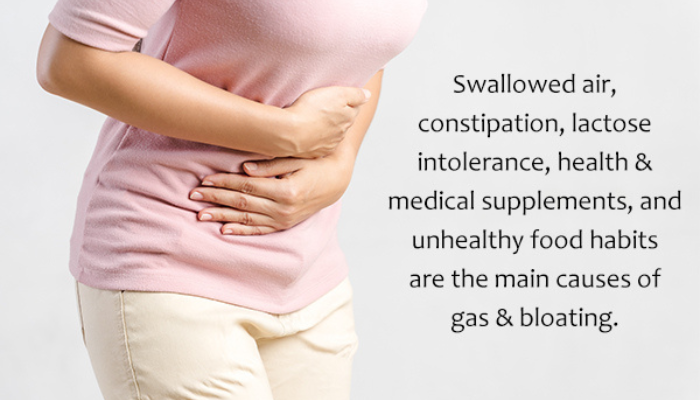Introduction
The discomfort of a bloated stomach – an experience many of us are all too familiar with. Whether it’s after a hearty meal, an indulgent weekend, or even seemingly out of nowhere, stomach bloating can make you feel heavy, uncomfortable, and self-conscious. But fear not; in this comprehensive guide, we’ll explore the causes of stomach bloating and provide you with “how to reduce stomach bloating” practical tips and strategies to reduce and prevent it.
Table of Contents
Understanding Stomach Bloating

What Is Stomach Bloating?
Stomach bloating occurs when your abdominal area feels swollen, distended, or full of gas. It’s often accompanied by symptoms like a tight, uncomfortable sensation, excessive gas, and sometimes even pain. Bloating can occur intermittently or persistently, and its intensity can range from mild to severe.
Common Causes of Stomach Bloating

Excessive Gas: One of the primary causes of bloating is the accumulation of gas in your digestive system. This can happen due to swallowing air (aerophagia) while eating or drinking, or from the fermentation of undigested food in your colon.
Food Intolerances: Some individuals are intolerant to certain foods, such as lactose or gluten, which can lead to gas, diarrhea, and bloating.
Overeating: Consuming large quantities of food in one sitting can overload your digestive system, leading to bloating and discomfort.
Fiber-Rich Foods: While fiber is generally healthy, an abrupt increase in your fiber intake can cause gas and bloating as your digestive system adjusts.
Carbonated Beverages: Soda and carbonated drinks contain gas that can get trapped in your stomach, causing bloating. we should avoid these types of drink to reduce stomach bloating.
Constipation: When stool remains in the colon for an extended period, it can ferment, leading to the production of gas and bloating.
Stress: High-stress levels can disrupt your digestion and contribute to bloating.
Gastrointestinal Conditions: Conditions like irritable bowel syndrome (IBS), inflammatory bowel disease (IBD), and gastroesophageal reflux disease (GERD) can cause chronic bloating.
Now that we’ve identified some common causes of stomach bloating, let’s explore practical strategies to reduce and prevent it.
Tips for Reducing Stomach Bloating

1. Mindful Eating
Start your journey towards a bloat-free belly with mindful eating habits. This involves being present during meals, savoring each bite, and paying attention to your body’s hunger and fullness cues. The following tips will help you practice mindful eating and help you to reduce stomach bloating.
Chew your food thoroughly to aid digestion and reduce the likelihood of swallowing air. and it helps to you reduce stomach bloating.
Eat in a calm, relaxed environment, free from distractions like TV or smartphones.
Slow down your eating pace to prevent overeating and gas buildup.
2. Identify Trigger Foods
Keeping a food diary can be immensely helpful in pinpointing foods that reduce stomach bloating. Common culprits include beans, lentils, broccoli, cabbage, dairy products, artificial sweeteners, and some high-sugar foods. If you notice a pattern, consider reducing or eliminating these foods from your diet.
3. Gradually Increase Fiber Intake
Fiber is essential for a healthy digestive system, but introducing it too quickly can lead to gas and bloating. Increase your fiber intake by eating more fruits, vegetables, whole grains, and legumes.This allows your digestive system to adapt over time.
4. Stay Hydrated
Adequate hydration is crucial for proper digestion. Maintain a healthy digestive system by drinking plenty of water through out the day, it help to reduce stomach bloating. Dehydration can lead to constipation, which can contribute to bloating.
5. Avoid Carbonated Beverages
Carbonated drinks introduce carbon dioxide into your digestive system, causing gas and bloating. Opt for still water or herbal tea as your primary beverages to reduce the likelihood of bloating.
6. Probiotics for Gut Health
Consider incorporating probiotics into your diet through foods like yogurt or supplements. Probiotics can help maintain a healthy balance of gut bacteria, potentially reducing bloating in some individuals.
7. Portion Control
Overeating puts excess pressure on your stomach and can lead to bloating. Pay attention to portion sizes and aim for smaller, more frequent meals to prevent overindulging.
8. Limit Gas-Producing Foods
Foods like beans, lentils, broccoli, and cabbage are known for producing gas in the digestive tract. While these foods are nutritious, reducing your intake or using digestive aids like Beano can help alleviate bloating.
9. Regular Exercise
Physical activity can stimulate digestion and reduce stomach bloating. Even a short walk after meals can be beneficial in preventing gas buildup in your stomach.
10. Manage Stress
Bloating can be caused by high levels of stress.. Practice stress-reduction techniques such as deep breathing exercises, meditation, or yoga to help alleviate both physical and mental tension. these following tips to help manage stress and reduce stomach bloating also.
11. Food Sensitivities
If you suspect that food sensitivities are causing your bloating, consider seeking medical advice. Tests can help identify specific intolerances, and your healthcare provider can guide you in managing them effectively.
12. Medications and Digestive Aids
In some cases, over-the-counter anti-gas medications or digestive aids may provide temporary relief from bloating. Consult your healthcare provider before using these medications regularly.
When to Seek Medical Advice

While most cases of stomach bloating can be managed with lifestyle changes and dietary adjustments, there are situations where you should seek medical advice:
Persistent or Severe Bloating: If your bloating is severe, unrelenting, or accompanied by significant pain or discomfort, consult a healthcare provider.
Unexplained Weight Loss: If you experience rapid or unexplained weight loss along with bloating, it could be a sign of an underlying medical condition that requires attention.
Blood in Stool: The presence of blood in your stool is a concerning symptom that should not be ignored. The symptoms may indicate a more serious digestive problem.
Sudden Onset of Symptoms: If you experience sudden and severe bloating, particularly if it’s accompanied by other concerning symptoms like vomiting or difficulty breathing, seek immediate medical attention.
Conclusion
Stomach bloating is a common and often uncomfortable issue, but with the right strategies and lifestyle adjustments, you can reduce and even prevent it. By practicing mindful eating, identifying trigger foods, gradually increasing fiber intake, staying hydrated, and managing stress, you can take control of your digestive health and enjoy a bloat-free life. Remember that while these tips can be effective for many, if you experience severe or persistent bloating, it’s essential to consult a healthcare provider to rule out any underlying medical conditions and ensure your overall well-being.
Foods to Avoid for a Bloat-Free Tummy
5 Foods That Help Reduce Stomach Bloating
Exercises to Beat Stomach Bloating: Your Ultimate Guide
Best 5 Ways to Reduce Stomach Bloating







